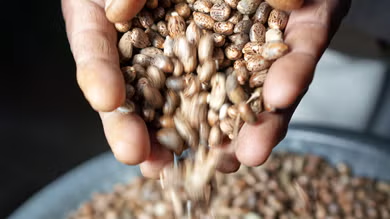Sustainability Challenge:
With an increased emphasis on sustainable chemistry practices, manufacturers are looking for solutions to enhance responsible consumption and production practices that have reduced impact on the environment.
Chemistry Solution:
Arkema’s bio-based polyamide 11 chemistry is derived from sustainable castor oil, which avoids competition with the world’s food supply and reduces deforestation consequences.
Sustainability Benefit:
Arkema has not only innovated an advanced polymer made from fully sustainable resources, but also has co-created the world’s first sustainable castor farming initiative, training farmers in India on sustainable agricultural practices.
As part of its commitment to enabling circularity and contributing to society, Arkema’s Advanced Bio-Circular materials platform is promoting sustainable castor oil farming initiatives to develop the feedstock for manufacturing Rilsan® polyamide 11, an ultra-high-performance resin chemistry derived entirely from renewable castor oil.

Arkema is a founding member of the Pragati initiative to drive sustainable castor oil farming in Gujarat, India, where 80 percent of the world’s supply of castor beans is produced. Since 2016, Arkema and its partners, BASF, Jayant Agro-Organics Ltd., and Solidaridad, have worked to educate and certify farmers to help: use good agricultural practices to increase yield, and therefore, income; efficiently use water resources and maintain soil fertility; drive adoption of good waste management practices; and enable enhanced health and safety practices and human rights.
The Pragati sustainable farming initiative has helped advance quality of life for thousands of Indian farmers and their families, while also helping to reduce their carbon footprint. As of September 2022, key outcomes include:
- Over 6,250 farmers trained, audited, and certified on sustainable farming practices;
- 50,000 tons of certified castor seed cultivated;
- Crop yield increased by more than 15 percent over the previous year;
- More than 6,000 hectares of castor beans farmed in accordance with the castor sustainability code -SuCCESS™ (sustainable Castor Caring Environmental & Social Standard) this year. (Over 19,000 hectares farmed cumulatively);
- Farmers from more than 80 villages in North Gujarat now participate in the program;
- Approximately 6,300 safety kits and crop protection product boxes distributed free of charge to farmers;
- Water consumption lowered by approximately 30 percent in the demo plots where water utilization is monitored.
To complement this work, in 2020 Arkema launched a recycling program called Virtucycle®, which helps connect customers that seek to recycle polyamide 11 and other materials, with those who want to use post-consumer and post-industrial recycled materials in their products.
The conversion of castor oil into polymers is the next part of the value chain that Arkema is committed to improving. Arkema has invested $400 million to launch a bio-factory in Singapore that will be dedicated to producing bio-based polymers. Manufacturing these polymers in Asia, where production of products made from polymers is expanding, can help set the stage for growth in use of advanced bio-circular materials.



